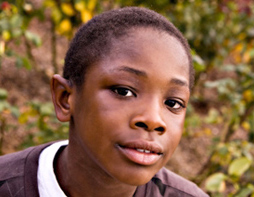Our Mission: To provide clinical care, family education and research on atopic dermatitis and other inflammatory skin diseases.

Cazz has severe eczema and life-threatening allergies. Learn what he has endured.
Atopic dermatitis (better known as eczema) is a skin disease that causes dry, sensitive skin that easily becomes red, scaly and intensely itchy. Eczema usually starts during the first two years of life, appearing on the face, arms and legs; later, it is often seen on the creases of the elbows, backs of the knees or the wrists. In adulthood, eczema can affect the hands or eyelids, and in severe cases, the rash can cover all areas of the body.
In eczema, the skin barrier is not normal, and the skin becomes easily irritated. At the same time, the skin’s immune system machinery is “hyper-excitable” to triggers that ordinarily do not bother individuals who don’t have the condition. Atopic dermatitis may be worsened by certain triggers, including excessive bathing without moisturization, harsh detergents, perfumes, preservatives, alcohol-containing toiletries and temperature extremes. Other triggers include dry skin, irritants, infection, inhalant allergens (house dust mites, pollens, and animal allergens), food allergens and stress.
When hyper-excitability of the skin is combined with an inadequate skin barrier, a rash and itching result. So it may be helpful to wear cotton clothing and avoid wool products, maintain mild temperatures, wash clothes in mild, fragrance-free detergents and avoid specific foods as appropriate.
Eczema is the most common chronic skin disorder seen in infants and children, affecting 15 to 20 percent of children in the United States sometime during their lifetimes. It is believed to be at least partly genetic, and there is likely a combination of genes that are inherited in families of children with the condition. Eczema is also frequently seen in children of families with a history of asthma and hay fever.
The impact of eczema can be profound, as it affects both the patient and family members, and has both physical and emotional effects.
State-of-the-Art Care at Rady Children’s
The first of its kind in the country, the Eczema and Inflammatory Skin Disease Center offers comprehensive patient care and is committed to integrating basic and clinical research for preventing and improving the treatment of eczematous dermatitis, psoriasis and other inflammatory skin diseases.
Our highly skilled and experienced dermatologists practice comprehensive care and are committed to integrating basic and clinical research for the prevention and improved treatment of eczema. Above all else, we will provide affirmation and hope to eczema patients and their families: affirmation of the profound effects of this condition and hope for a successful treatment.
In the News
- Multidisciplinary Atopic Dermatitis Program Utilization Results in Disease Improvement, HCP Live, features Lawrence Eichenfield, M.D.
- Dr. Lawrence F. Eichenfield Describes the Differences Between Treating Adult vs Pediatric Patients With AD AJMC, features Lawrence Eichenfield, M.D.
- This Is Eczema on Air Pollution, healthcental.com, features Lawrence Eichenfield, M.D.
- Multidisciplinary Approach Touted for Atopic Dermatitis, Medscape, features Lawrence Eichenfield, M.D.
- Dr. Lawrence F. Eichenfield Previews Revolutionary Developments in Atopic Dermatitis, American Journal of Managed Care, features Lawrence Eichenfield, M.D.
- Study Demonstrates Positive Results for Psoriasis Patients Treating with the Clarify Home Light Therapy System, Business Wire, features Lawrence Eichenfield, M.D.
- Pediatric Psoriasis Guidelines, Dermatology Times, features Lawrence Eichenfield, M.D.
- Psoriasis Tied to Higher Risk of Serious Liver Disease, Reuters, features Lawrence Eichenfield, M.D.
- Five Recent Developments in Psoriasis, Healio, features Lawrence Eichenfield, M.D.
- Screening Guideline for Pediatric Psoriasis Comorbidities Recommended, Healio, features Lawrence Eichenfield, M.D.
- Advances in Pediatric Inflammatory Skin Disease, Dermatology Times, features Lawrence Eichenfield, M.D.
- Melatonin Might Help Sleepless Kids with Eczema, Web MD, features Lawrence Eichenfield, M.D
- Rosacea Caused Half by Nature, Half by Lifestyle, U.S. News & World Report, features Lawrence Eichenfield, M.D.